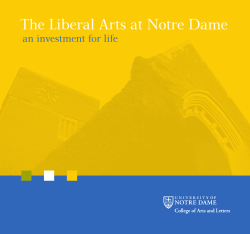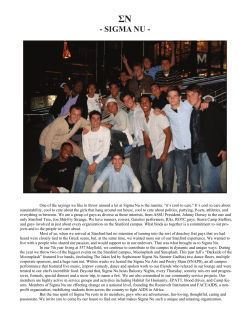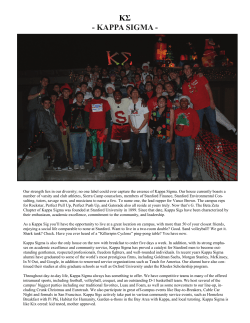
W T. H
WILLIAM T. HARBAUGH October, 2010 Department of Economics University of Oregon Eugene, Oregon 97403-1285 (541) 346-1244 http://harbaugh.uoregon.edu wtharbaugh@gmail.com RESEARCH I use methods from neuroeconomics and experimental economics to study altruism and motives for charitable giving, competitive behavior and decision-making in risky situations. I use economic experiments to study how economic models apply to children’s behavior. EDUCATION University of Wisconsin - Madison, Ph.D. in Economics, September 1, 1995. Montana State University, M.S. in Agricultural Economics, June 15, 1986. Montana State University, B.S. in Economics, March 15, 1983. ACADEMIC POSITIONS University of Oregon, 1995 to present. Assistant to Full Professor of Economics. National Bureau of Economic Research, 1998 to 2009. Faculty Research Fellow. Montana State University, 1989 to 1991. Economics Instructor. Groupe d’Analyse et de Théorie Economique (CNRS). Lyon. Fall 2008. Visiting Professor. Centro Interdipartimentale Mente/Cervello, Rovereto Italy. Winter 2009. Visiting Professor. PUBLICATIONS “The Fourfold Pattern of Risk Attitudes in Choice and Pricing Tasks.” Harbaugh, William T., Kate Krause, and Lise Vesterlund. Economic Journal. June 2010. (Lead article). “Neuroeconomics of Charitable Giving and Philanthropy.” Ulrich Mayr, William T. Harbaugh, Dharol Tankersley. Chapter for Neuroeconomics, Decision Making and the Brain. Paul Glimcher et al. Ed., Elsevier NYC. 2009. “Altruism in Experiments.” New Palgrave Encyclopedia of Economics. James Andreoni, William T. Harbaugh and Lise Vesterlund. 2008. “Neural Responses to Taxation and Voluntary Giving Reveal Motives for Charitable Donations.” William Harbaugh, Ulrich Mayr, Dan Burghart. Science. June 15, 2007. “Learning to Bargain.” Harbaugh, William T., Kate Krause, and Lise Vesterlund. Journal of Economic Psychology, January 2007. “Application of Economic Analysis to School-Wide Positive Behavior Support Programs.” Journal of Positive Behavior Interventions. Bruce Blonigen, William Harbaugh, Larry Singell, Robert H. Horner, Larry K. Irvin, and Keith Smolkowski. 2007. “Demonstrating Worker Quality Through Strategic Absenteeism.” Harbaugh, William T. and Anne van den Nouweland. International Game Theory Review, June 2005. “The Carrot or the Stick: Rewards, Punishments, and Cooperation.” Andreoni, James, William T. Harbaugh and Lise Vesterlund. American Economic Review, June 2003. “Trust in Children.” Harbaugh, William T., Kate Krause, Steven G. Liday, and Lise Vesterlund. Trust, Reciprocity and Gains from Association. Elinor Ostrom and James Walker editors. New York City, Russell Sage Foundation, 2003. “Risk Attitudes of Children and Adults: Choices Over Small and Large Probability Gains and Losses.” Harbaugh, William T., Kate Krause, and Lise Vesterlund. Experimental Economics, June 2002, 5(1): 53-84. “Re-examining the Empirical Evidence for an Environmental Kuznets Curve.” Harbaugh, William T., Arik Levinson, and David Molloy Wilson. The Review of Economics and Statistics, August 2002, 84(3): 541-551. (Reprinted in Environmental Economics: Critical Concepts in the Environment, Routledge 2007.) “GARP for Kids: On the Development of Rational Choice Behavior.” Harbaugh, William T., Kate Krause, and Timothy R. Berry. American Economic Review, December 2001, 91(5): 1539-1545. (Reprinted 2007 in Recent Advances in Behavioral Economics, Shlomo Maital Ed.) “Are Adults Better Behaved Than Children? Age, Experience, and the Endowment Effect.” Harbaugh, William T., Kate Krause, and Lise Vesterlund. Economics Letters, February 2001, 70(2), pp 175-181. “Children’s Altruism in Public Good and Dictator Experiments.” Harbaugh, William T. and Kate Krause. Economic Inquiry, January 2000, 38(10), pp 95-109. “Valuing Children’s Health and Life.” Harbaugh, William T. Proceedings of EPA conference on “Valuing Health for Environmental Policy with Special Emphasis on Children’s Health Issues, ” June 1999, Environmental Protection Agency, Washington D.C. “The Prestige Motive for Making Charitable Transfers.” Harbaugh, William T. American Economic Review, Papers and Proceedings, May 1998, 88(2), pp 277-82. “What Do Donations Buy?” Harbaugh, William T. Journal of Public Economics, February 1998, 67(2), pp 269-84. “If People Vote Because They Like To, Then Why Do So Many of Them Lie?” Harbaugh, William T. Public Choice, October 1996, 89(1-2), pp 63-76. WORKING PAPERS “Unexpected Utility: Experimental Tests of Five Key Questions about Preferences over Risk” James Andreoni and William T. Harbaugh. “The Menstrual Cycle and Performance Feedback Alter Gender Differences in Competitive Choices.” David Wozniak, William T. Harbaugh, Ulrich Mayr. “Social equity influences economic decisions in healthy older adults.” David R. Roalf, Suzanne H. Mitchell, William T. Harbaugh & Jeri S. Janowsky “Neural correlates of investment advice” John Chalmers, William Harbaugh, Ulrich Mayr, Dave Wozniak. “Bargaining by Children.” Harbaugh, William T., Kate Krause, and Steve Liday. “Power Indices for Revealed Preference Tests.” James Andreoni and William T. Harbaugh. “GARP for Thieves.” Michael Visser, William T. Harbaugh, and Naci Mocan. GRANTS and AWARDS External: Project CCARE (Stanford): “Neural Correlates of Altruism,” joint with Jim Doty, Ulrich Mayr and Jim Andreoni, $75,000. 2008-2009. National Institute of Aging: “Neuroeconomics of Philanthropy and Aging,” joint with Ulrich Mayr, ($504,000) 2007-2010. R21 AG030783-01. National Science Foundation, Grant SES-0112157 “Children’s development of economic skills and preferences,” joint with Kate Krause and Lise Vesterlund. ($340,000), 2001-2005. National Science Foundation, Grant SBR-9810847, “An experimental investigation into the economic behavior of children,” joint with Kate Krause ($215,000), 1998-2001. National Science Foundation, “Research experiences for undergraduates” supplemental awards, 1998-2002. ($15,000) MacArthur Foundation, “Gender differences in risk behavior: different preferences or different constraints?” joint with Kate Krause and Lise Vesterlund, 1999. ($5,000) Internal: Jim and Shirley Rippey, start up funding for SAIL, a set of summer camps to encourage low income kids to go to college. $50,000, joint with Bruce Blonigen. 2008. $90,000 in new funding, 2010. Professor of the Year, Oregon Commentator, 2008. University of Oregon, OCCU grant, 2006. ($10,000) University of Oregon, Educational Technology award, 2005. ($25,000) University of Oregon, Williams Council Undergraduate Teaching Award, 2004, joint with Bruce Blonigen. ($24,000) University of Oregon, Williams Council Undergraduate Teaching Award, 2002, joint with Bruce Blonigen. ($21,000) University of Oregon, Bray Faculty Fellowship, 2004. Economics Department Summer Research Award, 2004. Sterling Faculty Fellowship, 2000. William Walsh Faculty Fellowship, 2000. Junior Professorship Development Awards, 1996-2000, University of Wisconsin, Bullis Dissertation Fellowship ($20,000), 1994-1995. Wisconsin Alumni Research Foundation, Graduate Fellowship ($18,000), 1991-1992. PROFESSIONAL ACTIVITIES Senior Fellow, Mind and Life Institute, 2010 – present. Board Member, Society for NeuroEconomics, 2009 – present. Grant Review Panels: National Science Foundation SES-DRMS, 2003-2005. Grant Review Panels: Environmental Protection Agency, 2000, 2001, 2006 Talks: 2011: Symposium on Decision-making, University of Missouri. (Feb.) Gender and Competition workshop, University of Innsbruck, organized by Matthias Sutter. (May.) 2010: Chair, AEA meetings session on experimental economics with children. Atlanta. Talk, Mind and Life XX. with the Dalai Lama, Ernst Fehr, and Richard Layard. Zurich. http://www.compassionineconomics.org/ Short courses in Neuroeconomics and Altruism, GATE, Lyon France. (March) Talk at Stanford University conference on Compassion, Science and Society. Organized by Jim Doty and project CCARE, with the Dalai Lama. (October.) 2009: Talk at Burkhard Schipper’s conference on NeuroEndocrinologicalEconomics, UCDavis. Talk, Society for Neuroeconomics Meetings, Evanston. Invited talk, Aix-en-Provence Neuroeconomics workshop. Workshop presentations on neuroeconomics (with Giorgio Coricelli) and on the economic behavior of children, Trento Summer School in Economic Psychology. Invited talk at Simon Frazer experimental economics workshop Invited talk at University of Innsbruck Invited talk at Stanford University CCARE scientific meeting Invited talk at University of Zurich Invited talk at CIMeC, University of Trento, Rovereto Italy Keynote at “Economic Child” conference, University of Milan-Bicocca 2008: Invited talk at GATE, Lyon. Invited talk at Wissenschaftszentrum Berlin für Sozialforschung. Invited talk at University College Dublin. Invited talk at University Pompeu Fabra. Invited talk at University of Oslo conference on the development of moral norms. Poster at Society for Neuroeconomics, Park City Invited talk at Indiana University conference on childhood obesity. Keynote at Catholic University of the Sacred Heart, Milano. Invited talk at Willamette University “Law of the body” conference. Invited talk at Psychological Science Association meetings, Chicago. Invited talk at NYU. Invited talk at Neuroeconomics Handbook Conference, NYU. Paper at AEA meetings, New Orleans. 2007: Invited talk at UT-Dallas conference on measuring social preferences. Invited talk at Chicago GSB. Invited talk at Princeton conference on Altruism. 2006: Invited talk at NYU. Invited talk at Exeter University conference on Economic Socialization. Presentation at IAREP/SABE conference, Paris. Paper at Society for Neuroeconomics meeting, Park City Utah. Paper at ESA meetings, Tucson. Invited talk at Texas A&M. Invited talk at Duke. 2005: ESA meetings, Montreal. 2004: UCLA, NBER Summer Institute, NBER Environmental Economics meetings, Stanford (discussant). 2003: ESA sessions at ASSA meetings, Stanford University, CWRU, CU-Denver, Exeter University Psychology Department, Utah State University, Invited Speaker at the 2003 EPA NCEE, AAAS roundtable participant. 2002: Sorbonne, Université Lumière Lyon 2, European ESA meetings, University of Alberta, University of Arizona, Decision Research Incorporated, ESA sessions at ASSA meetings, ASGE sessions at ASSA meetings, NBER Summer Institute Program on Children. 2001: Economic Science Association Meetings, Harvard University, Cornell University, NBER Summer Institute Programs on Children and Public Economics, Society for Research in Child Development Biennial Meeting, Georgetown University, Econometric Society Meetings. TEACHING Courses Taught: Lower division undergraduate: Micro and Macroeconomic Principles, Environmental Issues Upper division undergraduate: Intermediate Microeconomics, Environmental Economics, Public Economics, Experimental and Behavioral Economics, Non-Profit and Community Economics. Graduate: Environmental Economics, Core Microeconomic Theory, Behavioral and Experimental Economics Ph.D. Dissertation Committees: Dave Wozniak, Economics, 2010. (Chair). First job, Eastern Michigan University. David Roalf, Neuroscience, 2010. Oregon Health Sciences University. First job, post-doc at Univ of Pennsylvania Eric Duquette, Economics, 2010. David Nash, Math, 2010. (Outside member.) Cara Bohon, Psychology, 2009. Dan Burghart, Economics, 2007. First job, Glimcher Lab post-doc, NYU. (Co-chair with Trudy Cameron.) Erica Johnson, Economics, 2009. Beilei Cai, Economics, 2008. David Hill, Mathematics, outside member, 2007. Dameon Wilbur, Economics, 2006. Katie Burns, “Social preferences in the Ultimatum game,” (Psychology Department) 2005. Mike Visser, “Essays in Experimental Economics,” 2005 (chair). First job, Sonoma State University. Gretchen Mester, “Green Power,” 2005 (chair). Ed Birdyshaw, “On the Theoretical basis of the Environmental Kuznets Curve," 2004. Scott Crosson (Political Science), “Exclusive Group Formation as a Collective Action Problem,” 2000. Yoko Nagase, “Acid rain and interregional redistribution in a federal system characterized by decentralized leadership information,” 1999. Sally Easley, “Eco-labeling as a viable option to protect groundwater quality,” 1999. Jodie Baird (Psychology), “Young children's understanding of the relation between actions and intentions,” outside member, 1999. Art Caplan, “Asymmetric externalities and strategic behavior : the case of moderate global warming,” 1996. M.S. Committees: Molloy Wilson (Environmental Studies), “New evidence on the relationship between pollution and income.” 1999, (Chair.) Art Barlow, “Testing the effects of different political institutions on spending.” 1997. (Chair.) Jerry King, “The Oregon Enterprise Zone program” 1997. (Chair.) Undergraduate Honors Students: 2008: Peter Anderson and Ben Brookins, “Using Google to Increase Online Donations.” Jacquie Dodd, Lisa Polpowski, Peter Zochowski, “The effect of easy refund anticipation loans on EITC takeup.” Alex Baldwin and Travis Walker, “Forecasting Oregon’s Pell Grant take-up rates.” Tom Bode and Loren Snow, “Predicting campus crime rates.” 2007: Ben Bushong, “Revealed Preference and Mean-Variance Investing” Steven Green, Jason Schwartz “Cost-Benefit Analysis and Prediction Markets and the Proposal for University of Oregon Prediction Markets” Brooke Adams, Kent Strauss. “A Benefit-Cost Analysis of Recycling Programs for the Eugene Saint Vincent de Paul.” Joe Edgar, Eric Gefre " University Student Electrical Consumption: Comparison and Analysis." Zach Zollinger, Whit Perkins “An Analysis of Charitable Giving to the Eugene Water and Electric Board.” 2006: Drew Shipley, “In-Group Out-Group effects in Eugene and Sicua Children”, Psychology Department Honors Prize. David Yaffe. “To Bluff or Not to Bluff: Principles and Practice from Laboratory Experiments.” Economics Department Honors Prize. Rob Wyman, “Measure 37”. Jenny Yaillen and and Nate Blair. “A Benefit Cost Study of a New Preschool Program Based on Neuroplasticity.” Jessica Brown, Joseph Reiter, & Sheena Pietzold. “Housing Price Models for the Walnut Station Redevelopment Area.” Katie Dieken and Janet Gerde. “UO Economics Summer Camp.” Michael Connolly and Aaron Frank. “Central Oregon Business Index.” Sean Wallace. “Game Theory and Interactive Learning Computers in the Classroom.” 2005: Jason Payton and Koushi Sunder, “Oregon Business Confidence Survey.” Brian Deigan and Jeremiah Crider, Oregon Lottery Auction.” Chelsea Byers, Jesse Cathey and Rob Wyman, “Effects of Measure 37 on Oregon Land Values.” 2004: Nathan Kamesar and Amos Nadler, “WTP for Eugene Recycling.” Tom O’Brien and Justin Valasek, “Classroom Peer Effects.” Tiancong (Kathleen) Li , Cleo Neculae, and Ryan Sullivan, “Performing Arts Organizations: Ticket buying and Donations.” Sam Boggess and Dan Claric, “Paratransit Demand.” 2003: Ivan Thomman, “Evaluating Emissions Trading Programs Using Computer Aided Market Simulations.” UO Honors College. Oliver Levine, “Effects of Market Power and Strategic Manipulation Within a Simulated Kyoto Protocol Emissions Trading Program.” UO Honors College. 2003. Jared Lunsford, “Endogenous Information Cascades.” 2003. Ryan Suvoy, “Giving or Taking.” 2003. Anne Jackson and Lindsay Beckman, “Cost Analysis of the Adolescent Transitions Project” 2003. Department prize for best undergraduate group paper. Graham Crawford and Aaron Steinberger, “What Gives?” Jared Durham and Dane Jensen, “The Property Value Effects of the South Ridgeline Trail.” 2002 and earlier: Hope Siler and Kristen Walker, “Child Maltreatment in Oregon.” 2002. Steve Liday, “Trust and Positive Reciprocity in Children: An Experimental Study.” 2001. Tie for department prize for best undergraduate paper. Kristen Johnson, “Age and gender differences in altruistic behavior,” 2000. Department prize for best undergraduate paper. Nate Reed, “p-Beauty contests in the 6 Grade,” 2000. Andy Johnston, “Decision making by children under risk and uncertainty,”1998. Department prize for best undergraduate paper. John Hobbs, “Testing the endowment effect in children,” 1998, with highest honors. Nasser Brake, “Economics of wind energy,” 1996. SERVICE Community: Member, Oregon State Advisory Committee, United States Commission on Civil Rights. 2010-present. Co-Founder and Co-Director of “SAIL: Summer Academy to Inspire Learning.” 2006present. Bruce Blonigen and I started this free all-volunteer program to encourage bright middle schoolers from low SES backgrounds to go to college, by giving them a week long college experience. It has grown to include neuroscience, nanoscience, optics, and journalism camps and has received a $50,000 gift from Jim and Shirley Rippey to fund further expansion. http://sail.uoregon.edu Chief Information Officer and Blogger for http://openuporegon.com a website devoted to making it easier for anyone to get Oregon public records. Published a free online unauthorized pdf of the copyrighted Oregon Attorney General’s Guide to Public Records and Meetings with Carl Malamud of http://public.resources.org. This effort and the substantial public support it garnered led to a 2009 “Government Transparency Initiative” by Oregon Attorney General John Kroger, promising substantial reforms in the administration of Oregon’s public records law. Chief Curator of the online Museum of Fabric Brain Art, at http://neuroscienceart.com. Register Guard Op-Ed piece on “Peak Oil Fears”, Feb 3rd 2006. Portland Oregonian Op-Ed piece. “Think Selfishly,” on altruism and economics. April 4, 2004. Portland Oregonian Op-Ed piece. “Giving Green, Seeing Red,” on the September 11th fundraising scandal. Nov. 11, 2001. Research featured in BBC/Learning Channel TV show, Fall 2002. Community roundtable discussion on “Take Back Your Time Day,” (Against it.) Fall 2003. Economics Department: Salary Review Committee (elected), 2001-2, 2003-2007. Charitable Fund Drive Coordinator, 2004 – 2008. Graduate Teaching Fellows Chair, 2000-2001. Computer Committee, 1997-2000. Chair 1997-1999, 2001-current. Committee on outside funding, 1999-2001. Mikesell/Environmental steering committee, 1997-1999. Job Market Director, 1995, 1998-2002. Ph.D. Program committee, 1997-1999. Core Exam committee, 1998-1999. Chair, 2000-2003. Human Subjects Approval Officer, 1997-current. Co-Director, Summer Academy to Inspire Learning, 2006-current. College and University Committees: Co-Director and Founder with Bruce Blonigen, Summer Academy to Inspire Learning. 2006-present. http://sail.uoregon.edu Associate Director, Society of College Scholars, 2006-2008. Scholarship committee, 2007-2008, 2009-2010. UO Campus Planning Committee 2005-2007. College of Arts and Sciences Curriculum Committee, 2003-2005. Environmental Studies Graduate Admissions Committee, 1997-1998 Environmental Studies Curriculum Reform Committee, 1997-1999. Non-Academic Achievements: Merit badges in Canoeing, Cooking, and Marksmanship. Scout Troop 19, 1971-74. Bicycle mechanic and Director of Moped Repair (Solex et Motobecane). Blue Wheel Bike Shop, Bill Gray Proprietor, Charlottesville VA, 1972-1978. FCC First Class Radio-Telephone Operator’s License, 1977. Substitute DJ for “Nothing But The Blues,” WTJU, Charlottesville VA, summer 1977. TV control room “Operator on Duty.” WCHV, Charlottesville VA, 1978. Fired for my inability to maintain a productive working relationship with the vacuum tubes on a 1964 Ampex VR-2000 quad-head videotape recorder. Swung a shovel and a pick-axe. The Garden Spot, Charlottesville VA, 1979. Vespa repairman. Tumbleweed Cyclery, Chapel Hill NC, 1979. Doodlebugger, Juggie, Dynamite Carrier, Chainman, Rodman, and Junior Surveyor. Mile-Hi, CGG, and Seiscom Delta. From the Uintas north to the Sukunka and Star Valley east to the Missouri Breaks. 1980-1982. Migrant farm worker. Apple thinning, apricot and peach picking. Columbia River Basin. 1983. VW air-cooled engine rebuilding and maintenance. El Fuerte Sinaloa, Jackson Hole Wyoming, Bozeman Montana, and way too many other roadside locations. 19801987. All-round boat repair. A to Z Marine, San Diego, 1986. Macerator pump specialist. Marine Electrician. Power and Wind Marine Electronics, San Diego, 1987. Leonard’s evaluation: “You seem like a nice guy, but you really don’t know much about electricity.” Demographer. National Decision Systems, Encinitas, CA, 1988-1989. Fairy-tale writer. “The Truth About Cinderella and Her Evil Stepsisters” Bill Harbaugh and Daughters. Published in Expressions, Allyn & Bacon / Longman, 2002.
© Copyright 2024












